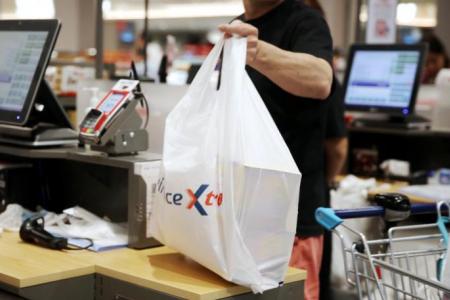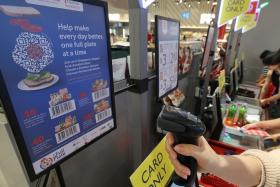Shoppers to pay at least 5 cents per disposable bag at most supermarkets from mid-2023
Consumers will from mid-2023 have to pay at least five cents for every disposable bag - regardless of material - they take at most supermarket outlets here, said Minister of Sustainability and the Environment Grace Fu on Monday (March 7).
"Charging per bag is equitable and effective," she said during the debate over her ministry's budget.
Ms Fu added: "The more bags we take, the higher the amount we pay. Charging from the first bag would also encourage shoppers to bring their own bags from the outset."
For a start, this charge will apply to supermarket chains with an annual turnover of more than $100 million.
This means that shoppers will have to pay for disposable bags at around two-thirds of all supermarket outlets in Singapore, including those under NTUC FairPrice, Dairy Farm, Sheng Siong and Prime.
Online retailers and convenience stores will be excluded from implementing this mandatory minimum charge for disposable bags of all materials.
But Ms Fu said a disposable bag charge is not a ban on such bags, and would not remove the public's access to disposable bags.
Instead, the charge aims to encourage the public to be more judicious with their use of disposables.
Funds collected from the charge will be kept by the supermarkets, but information on the number of bags issued and proceeds received from the bag charge must be published to ensure accountability, Ms Fu said.
For example, the disposable bag surcharge revenue from supermarket chain FairPrice, which has since November 2019 been charging shoppers who take such bags 20 cents per transaction, is channelled into green programmes like the National Parks Board's OneMillionTrees movement.
Ms Fu said: "We strongly encourage supermarket operators to channel the proceeds obtained from the bag charge to environmental or social causes, and consider initiatives to support lower-income families."
The new minimum charge for plastic bags is the final outcome of 11/2 years of extensive consultation with the industry and the public, where work groups were convened to draft guidelines and feedback on suggested guidelines were collected.
One of the key surveys of this process found that a significant majority of Singaporeans were amenable to a plastic bag charge.
In NEA's survey of around 1,000 respondents in September last year, more than 80 per cent agreed that the excessive use of disposable bags has a negative impact on the environment and close to 90 per cent agreed that they had a part to play in reducing the use of disposable bags.
In addition, more than 70 per cent agreed that a mandatory charge would reduce usage of such bags.
Ms Fu added: "Over time, we hope that the charge will encourage Singaporeans to adopt sustainable habits and bring our own bags when shopping at supermarkets and other stores."
Environmental groups have been calling for a charge on disposable bags for years.
A 2018 study done by the non-profit Singapore Environment Council found that shoppers take 820 million disposable carrier bags from supermarkets a year, an average of 146 bags a person.
These environmental groups therefore welcome this new minimum charge.
Ms Aarti Giri, the founder of Plastic-Lite Singapore, said: "Charging for disposable carriers is a much awaited and much needed policy and Singapore would finally be joining the bandwagon of countries that have done so in the past few years successfully, with encouraging results."
Ms Aarti also said the requirement for supermarkets to declare the use of monies raised from the new minimum charge was "reassuring", and hopes that the proceeds would be "channelled back into efforts to protect nature, biodiversity and realising national and global environmental goals as well as other charitable and social causes".
Besides praising the move, environmental groups, such as Zero Waste SG, recommended further steps be taken to curb plastic consumption in Singapore.
Ms Tan Huileng, associate director of Zero Waste SG, the environmental charity that released a plastic bag charge policy recommendation paper in 2016, said: "We hope that, apart from larger supermarkets, charges can be explored for online grocery shopping, as well as for smaller retailers."
Get The New Paper on your phone with the free TNP app. Download from the Apple App Store or Google Play Store now


